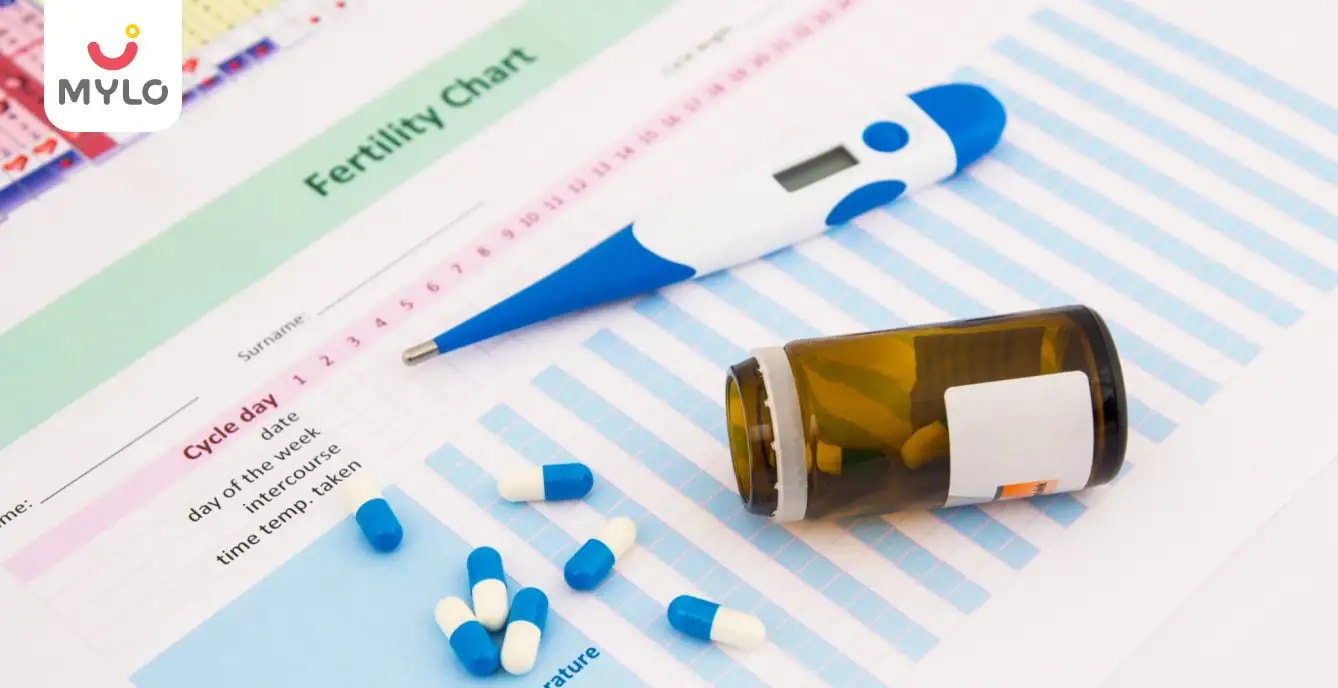Home

Fertility Problems

Fertility Pills: Your Solution to Get Pregnant Faster
In this Article

Fertility Problems
Fertility Pills: Your Solution to Get Pregnant Faster
Updated on 3 November 2023



Medically Reviewed by
Dr. Shruti Tanwar
C-section & gynae problems - MBBS| MS (OBS & Gynae)
View Profile

If you are trying to conceive and struggling with fertility problems, you are not alone. Many couples face difficulty in getting pregnant due to various reasons such as hormonal imbalances, irregular menstrual cycles, or other medical issues. While there are multiple treatment options available, one of the most effective solutions is taking fertility pills.
In this article, we will explore the best fertility pills for women and men and their benefits. We will also understand the potential side effects of taking fertility pills to get pregnant and the best pratices to follow while consuming them.
Understanding Fertility Problems
Before diving into the best fertility pills, it's important to understand the causes of fertility problems. In women, the most common cause is ovulation disorders, which can be caused by hormonal imbalances, thyroid problems, or polycystic ovary syndrome (PCOS).
In men, low sperm count, poor sperm quality, or hormonal imbalances are the primary causes of fertility problems. Other factors that can affect fertility in both men and women include age, stress, and lifestyle choices such as smoking or excessive alcohol consumption.
What are Fertility Pills?
Fertility drugs or pills are medications that help regulate and stimulate ovulation in women or sperm production in men. These pills contain hormones or other substances that affect reproductive organs and increase the chances of getting pregnant. They are commonly prescribed by doctors to couples who are struggling with infertility.
Benefits of Taking Fertility Pills to Get Pregnant
Fertility tablets or pills can provide numerous benefits for couples trying to conceive. Some of the key benefits include:
- regulates menstrual cycles
- stimulates ovulation
- alleviates conditions such as PCOS or endometriosis
- increases sperm production
- improves sperm quality
- increases the chances of getting pregnant
Best Fertility Pills for Women
There are several fertility pills available for women, but some of the most effective ones include:
1. Clomid
Clomiphene citrate (Clomid) is usually prescribed if a woman is not ovulating normally. Clomid helps stimulate ovulation by blocking estrogen receptors in the brain. It helps release specific hormones by stimulating the pituitary and hypothalamus glands located in the brain. These hormones trigger the ovaries to make eggs and include the following:
- GnRH (gonadotropin-releasing hormone)
- FSH (follicle-stimulating hormone)
- LH (luteinizing hormone)
It is usually taken for five days at the beginning of the menstrual cycle. Clomid has a high success rate, with about 80% of women ovulating within the first three months of taking it. If ovulation doesn't occur by then, the doctor may suggest increasing the dosage by 50 mg/a day each month, up to 150 mg.
2. Letrozole
Letrozole is another fertility pill that helps regulate ovulation. It works by reducing the production of estrogen, which stimulates the release of follicle-stimulating hormone (FSH) and luteinizing hormone (LH). Letrozole is often used as an alternative to Clomid, especially for women with PCOS or unexplained infertility.
Letrozole works by blocking the enzyme aromatase which lowers estrogen levels and stimulates ovulation. The recommended starting dose is 2.5 mg once a day for 5 days, beginning between days 2 and 5 of menstrual cycle. For this, you will take two tablets of letrozole daily from Cycle Day 3 to 7.
3. Metformin
Metformin is a medication commonly used to treat type 2 diabetes, but it can also be used as a fertility pill. Metformin helps regulate insulin levels and alleviate PCOS, which can affect ovulation and fertility. It is often used in combination with other fertility pills for better results.
To use Metformin for fertility, it is usually started at a low dose of 500 mg once daily, then increased to 500 mg twice a day after one week, and then to 500 mg three times daily after another week. Its use can help to regulate menstrual cycles, treat Clomid resistance, and reduce the risk of ovarian hyperstimulation syndrome (OHSS) during in vitro fertilization (IVF) treatment.
4. Bromocriptine
Bromocriptine, also known as Parlodel, is a fertility pill that helps treat hyperprolactinemia, a condition that can affect fertility by causing irregular menstrual cycles and decreased ovulation. Bromocriptine works by reducing the production of prolactin, a hormone that stimulates milk production in lactating women.
To use Bromocriptine for fertility, it is recommended to gradually start with a low dose of ½ tablet at night right before bedtime for the first week. This allows the body to get accustomed to the medication and reduces the chances of side effects such as dizziness, headaches, and nausea.
Blood tests are also needed to monitor prolactin levels to determine if the dose needs to be adjusted. After the first week, the dose can be increased to ½ tablet twice a day.
5. Antagon
Antagon (ganirelix acetate) is an injected drug that can help prevent early ovulation in women undergoing fertility procedures. The fertilization rate ranges between 62.4% and 61.9%, while the implantation rates are estimated between 21.1% and 26.1%. On the other hand, pregnancy rates are reported to be between 30.8% to 38.4%.
250 mcg/0.5mL of Antagon is administered on the second or third day of a cycle, during the mid-to-late phase after initiating follicle-stimulating hormone (FSH).
Women looking to boost their fertility can also try Mylo's Ovaluna Female Fertility Capsules, which are an effective blend of fertility-boosting supplements like CoQ10, L-methyl folate, zinc, Vitamin D2, Vitamin B12 and shatavari, among others. These ingredients are known to improve egg health and development, maintain hormonal balance, prevent fertility complications and regulate menstrual and ovulation cycle.
Fertility Pills for Men
Fertility drugs for men can help increase sperm production and improve sperm quality. Some of the most best fertility pills for men include:
1. Clomiphene
Clomiphene is a medication that helps block the hormone estrogen from interacting with the pituitary gland, which leads to an increase in follicle-stimulating hormone (FSH) production. This, in turn, stimulates the testicles to produce more testosterone and sperms.
To use Clomid, a doctor must first determine the appropriate dosage based on the individual's condition. The typical dose is 25 to 100 milligrams (mg) per day, taken orally for five days. It is usually taken for three to six months to see results.
2. Human Chorionic Gonadotropin (HCG)
HCG is a hormone that stimulates the production of testosterone and sperm in men. HCG works by stimulating the Leydig cells in the testicles to produce testosterone. It has a longer half-life and can increase testosterone levels more than other medications such as anastrazole and clomiphene.
To use HCG for male fertility, it must be given by injection either intramuscularly or subcutaneously. The injection schedules differ, but most experts recommend three times a week with a dosage of 1,500-2,000 IU to achieve a testosterone level within the normal range.
3. Anastrozole
Anastrozole works by inhibiting the conversion of testosterone to estrogen, leading to an increase in testosterone and a decrease in estrogen levels. This results in an improvement in semen parameters and an increase in sperm count.
The medication is usually taken orally in tablet form, at a dose of 1 mg per day, and can be taken with or without food. It is usually taken for six months to see results.
Men looking to boost their fertility can also try Mylo's Potenmax Testosterone Booster Capsules that are an effective blend of Omega-3 fatty acids, safed musli, ashwagandha, fenugreek and kaunch beej, among others. These ingredients can help improve sperm motility and quality, increase testosterone levels, enhance physical performance and boost energy and stamina.
What Factors Should You Consider Before Taking Fertility Pills?
While taking fertility pills to get pregnant can be effective, there are several factors you should consider before taking them.
- First, it's important to consult with a doctor to determine the underlying cause of your fertility problems and whether fertility drugs are the right solution for you.
- It's also important to consider the potential side effects of these pills and whether they outweigh the benefits.
- Finally, it's important to follow the dosage instructions carefully and take the drugs under the supervision of a doctor.
Are There Any Side Effects of Fertility Drugs?
Like any medication, fertility tablets can have side effects. Common side effects of these pills for women include hot flashes, mood swings, and bloating. Fertility pills for men can cause acne, breast enlargement, and mood swings.
In rare cases, fertility drugs can also increase the risk of ovarian or breast cancer. It's important to discuss potential side effects with a doctor before taking even the best fertility pills.
Best Practices for Taking Fertility Tablets
To get the most out of fertility tablets, it's important to follow some best practices.
- First, make sure to take the pills under the supervision of a doctor and follow the dosage instructions carefully.
- It's also important to maintain a healthy lifestyle by eating a balanced diet, exercising regularly, and avoiding alcohol and smoking.
- Finally, be patient and give fertility pills time to work, as it can take several months to see results.
You may also like: How to Increase Fertility in Women: Ayurvedic Herbs to Help You Conceive Faster
Final Thoughts
Fertility problems can be frustrating and stressful, but there are effective solutions available. Taking fertility pills to get pregnant can help regulate ovulation and sperm production and increase the chances of conception. While there are potential side effects and factors to consider, fertility pills are a safe and effective option for many couples. If you are struggling with fertility problems, talk to your doctor about whether fertility pills are the right solution for you.
References
1. Kaur H, Bansal GK, Althobaiti F, Aldhahrani A, Usmani S, Bala M. (2021). Prevalence of reproductive drugs usage in humans and animals: A pilot study in Patiala city of India. Saudi J Biol Sci.
2. Derman SG, Adashi EY. (1994). Adverse effects of fertility drugs. Drug Saf.
Tags

Mylo Ovaluna Female Fertility Tablets - 60 Capsules
Improves Egg Health & Folate Levels |Improves Reproductive Health & Hormonal Balance
₹ 1799

4.3
(182)


3604 Users bought





Medically Reviewed by
Dr. Shruti Tanwar
C-section & gynae problems - MBBS| MS (OBS & Gynae)
View Profile


Written by
Priyanka Verma
Priyanka is an experienced editor & content writer with great attention to detail. Mother to an 11-year-old, she's a ski
Read MoreGet baby's diet chart, and growth tips

Related Articles
Related Topics
RECENTLY PUBLISHED ARTICLES
our most recent articles

Diet & Nutrition
গর্ভাবস্থায় আলুবোখরা: উপকারিতা ও ঝুঁকি | Prunes During Pregnancy: Benefits & Risks in Bengali

Diet & Nutrition
গর্ভাবস্থায় হিং | ঝুঁকি, সুবিধা এবং অন্যান্য চিকিৎসা | Hing During Pregnancy | Risks, Benefits & Other Treatments in Bengali

Women Specific Issues
স্তনের উপর সাদা দাগ: লক্ষণ, কারণ এবং চিকিৎসা | White Spots on Nipple: Causes, Symptoms, and Treatments in Bengali

Diet & Nutrition
গর্ভাবস্থায় পোহা: উপকারিতা, ধরণ এবং রেসিপি | Poha During Pregnancy: Benefits, Types & Recipes in Bengali

Diet & Nutrition
গর্ভাবস্থায় মাছ: উপকারিতা এবং ঝুঁকি | Fish In Pregnancy: Benefits and Risks in Bengali

Diet & Nutrition
গর্ভাবস্থায় রেড ওয়াইন: পার্শ্ব প্রতিক্রিয়া এবং নির্দেশিকা | Red Wine During Pregnancy: Side Effects & Guidelines in Bengali
- ইনার থাই চ্যাফিং: কারণ, উপসর্গ এবং চিকিৎসা | Inner Thigh Chafing: Causes, Symptoms & Treatment in Bengali
- গর্ভাবস্থায় ব্রাউন রাইস: উপকারিতা ও সতর্কতা | Brown Rice During Pregnancy: Benefits & Precautions in Bengali
- Velamentous Cord Insertion - Precautions, Results & Safety
- Unlock the Secret to Flawless Skin: 7 Must-Have Qualities in a Face Serum
- Unlock the Secret to Radiant Skin: How Vitamin C Serum Can Transform Your Complexion
- Gender No Bar: 10 Reasons Why Everyone Needs a Body Lotion
- Unlock the Secret to Radiant Skin How to Choose the Perfect Body Lotion for Your Skin Type
- Top 10 Reasons to Apply a Body Lotion After Every Bath
- Communication in Toddlers: Milestones & Activities
- How to Improve Vocabulary for Toddlers?
- A Comprehensive Guide to Understanding Placenta Accreta
- Vulvovaginitis in Toddlers Causes, Symptoms and Treatment
- A Comprehensive Guide to Understanding Cerebral Palsy in Children
- Bitter Taste in Mouth During Pregnancy: Understanding the Causes and Remedies


AWARDS AND RECOGNITION

Mylo wins Forbes D2C Disruptor award

Mylo wins The Economic Times Promising Brands 2022
AS SEEN IN

- Mylo Care: Effective and science-backed personal care and wellness solutions for a joyful you.
- Mylo Baby: Science-backed, gentle and effective personal care & hygiene range for your little one.
- Mylo Community: Trusted and empathetic community of 10mn+ parents and experts.
Product Categories
baby carrier | baby soap | baby wipes | stretch marks cream | baby cream | baby shampoo | baby massage oil | baby hair oil | stretch marks oil | baby body wash | baby powder | baby lotion | diaper rash cream | newborn diapers | teether | baby kajal | baby diapers | cloth diapers |








